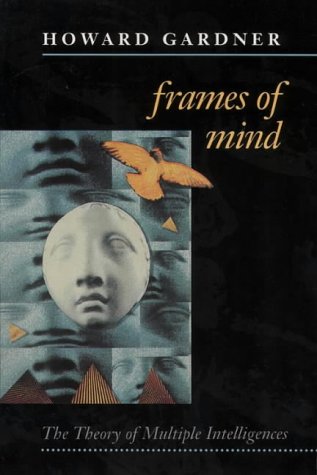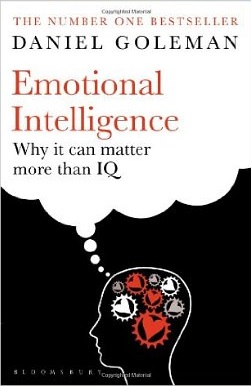 |
 |
Emotional Intelligence | |||||
|
|
|||||||
|
In Frames of Mind (1983) Howard Gardner proposed that intelligence was not a unitary phenomenon but was composed of a number of different strands. Gardner�s Multiple Intelligence model included Interpersonal and Intrapersonal Intelligences � which may be said to have laid the foundation for later work on Emotional Intelligence (EI). |
|||||||
|
Peter Salovey and John Mayer coined the term Emotional Intelligence in 1990. Identifying EI as a �non-cognitive� intelligence, they described emotional intelligence as "a form of social intelligence that involves the ability to monitor one�s own and others� feelings and emotions, to discriminate among them, and to use this information to guide one�s thinking and action."
Building on the work of Salovey and Mayer, Daniel Goleman popularised the concept of "Emotional Intelligence" (EI) in his book of that title. Goleman trained as a psychologist at Harvard where he worked with David McClelland. McClelland was concerned that traditional tests of cognitive intelligence told us only part of the picture about what it takes to be successful in life.
|
|||||||
|
Gardner, H. (1983) Frames of Mind: The Theory of Multiple Intelligences. New York: Basic Books.
Salovey, P. & Mayer, J.D. (1990). Emotional intelligence. Imagination, Cognition, and Personality, 9, pp185-211.
Goleman, D. (1996) Emotional Intelligence: why it can matter more than IQ. London: Bloomsbury Publishing.
|
|||||||
 |
Frames of Mind: The Theory of Multiple Intelligences Howard Gardner Basic Books
|
Emotional Intelligence Daniel Goleman Bloomsbury Publishing
|
 |
||||
|
WHAT IS EMOTIONAL INTELLIGENCE?
EI is not about being emotional. EI is not about being touchy-feely. EI is not about being nice all the time.
EI is about knowing how we and others feel, why we feel that way and what can be done about it. EI is about understanding and using the power of our emotions wisely. EI is about knowing how to use our passions to motivate ourselves and others. EI is about knowing how to express our distressing emotions appropriately. EI is about being honest.
EI IN THE WORKPLACE
Until recently (when "life-work balance" has become a more prominent issue) there was an unsung mantra that workers should separate their personal and professional lives. It was understood that our emotions should be reserved for our "personal lives" and that the workplace required the exercise of a more logical approach. However, if our work involves working with other people (and there are few contexts where it does not) then we cannot ignore the fact that people are simply a bundle of emotions wrapped up in a physical body.
Whether we like it or not, our emotional response to a situation is often the primary one - and one which we struggle to sublimate. Our emotions originate within our limbic system, a part of the brain that is deeper seated than our "rational thinking brain" (located in the neo-cortex). Our emotions affect motivation, morale and effectiveness. How we think (rationally) and how we feel can often conflict. EI is the capacity to reconcile and harmonise the two. EI is not an optional extra. It defines who we are as individuals, affecting our interactions within society and our effectiveness within the workplace.
Those in charge of organisations ignore at their peril the fact that talented and skilful employees will not necessarily produce their best work or achieve their true potential if they are not happy at work. Bosses who employ a "do as I say" management style (for example) will find that their most talented employees will not only under-perform but will be keen to leave for new pastures where independent problem-solving satisfies their needs for self-fulfilment.
|
|||||||
|
EMOTIONAL COMPETENCIES
Goleman proposed that individuals are born with a general emotional intelligence which determines their potential for developing the 5 emotional competencies.
|
|||||||
|
Self awareness - knowing your emotions
|
|||||||
|
Self regulation - managing your emotions
|
|||||||
|
Self-motivation - entering into emotional states attached to achievement and success
|
|||||||
|
Empathy - recognising and understanding other people's emotions
|
|||||||
|
Managing relationships - and the emotions of others.
|
|||||||
|
However, we should be wary of defining any form of intelligence as a list of �competencies� because competence does not equate to intelligence. A person may have (a particular kind of) intelligence yet may not have developed (skill or) competence in that domain because they are uneducated, untrained, or inexperienced. (This applies across the range of Gardner's Multiple Intelligences.)
We must be wary of confusing (developed or nurtured) skills with (innate or natural) intelligence.
|
|||||||
|
EQ (Emotional Intelligence) test from iVillage. (20 multiple choice questions)
Emotional IQ test from Queendom (106 scaled response questions)
Click here for a training booklet from CRM Learning
Click here for an alternative view of EI by Steve Hein in his online book EQ for everybody
|
|||||||